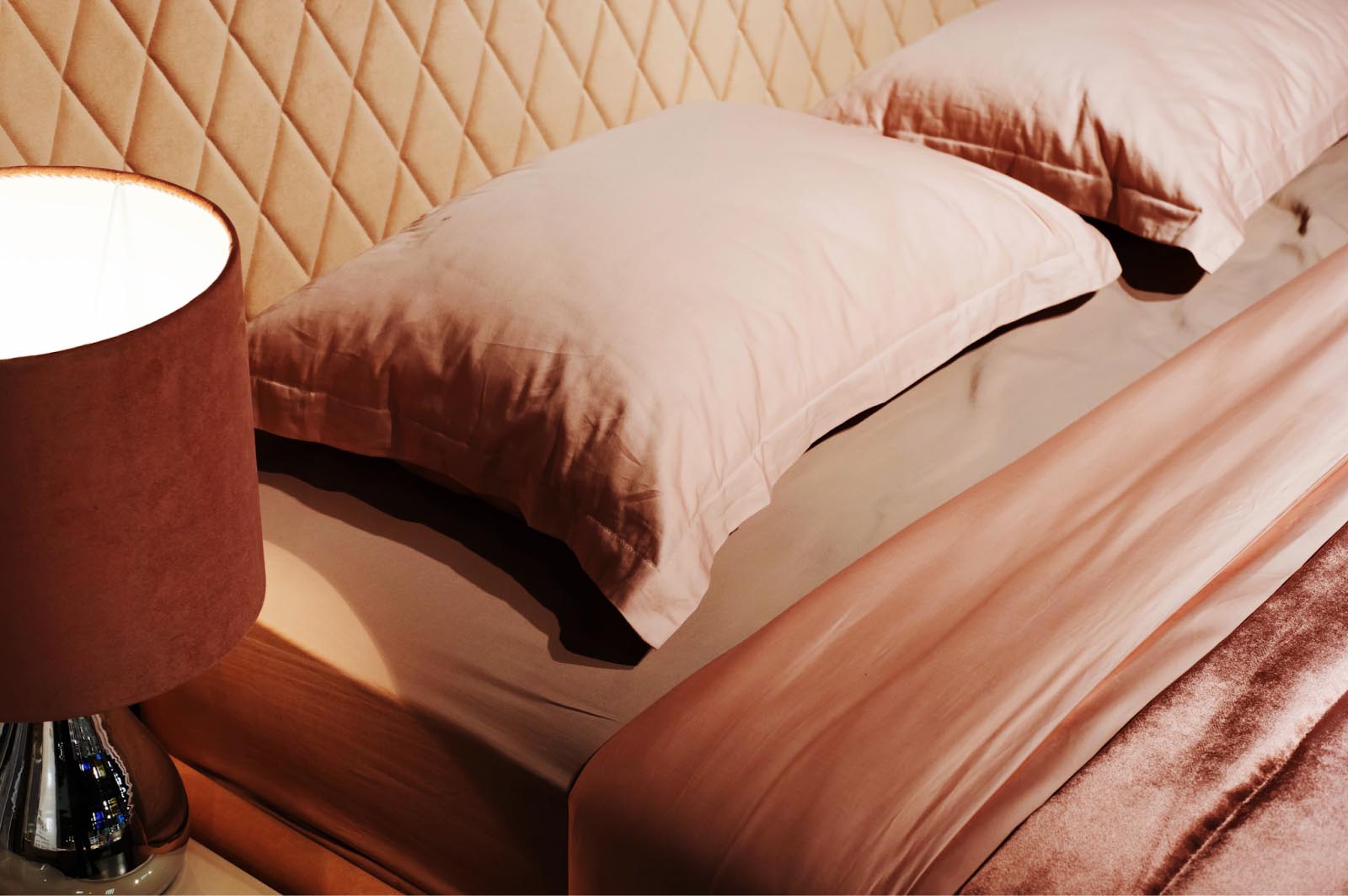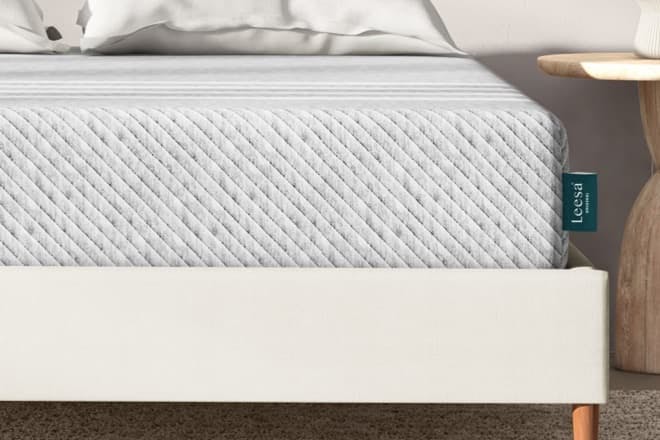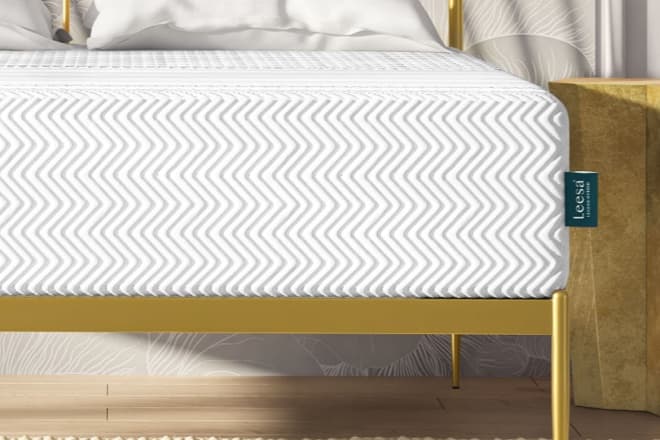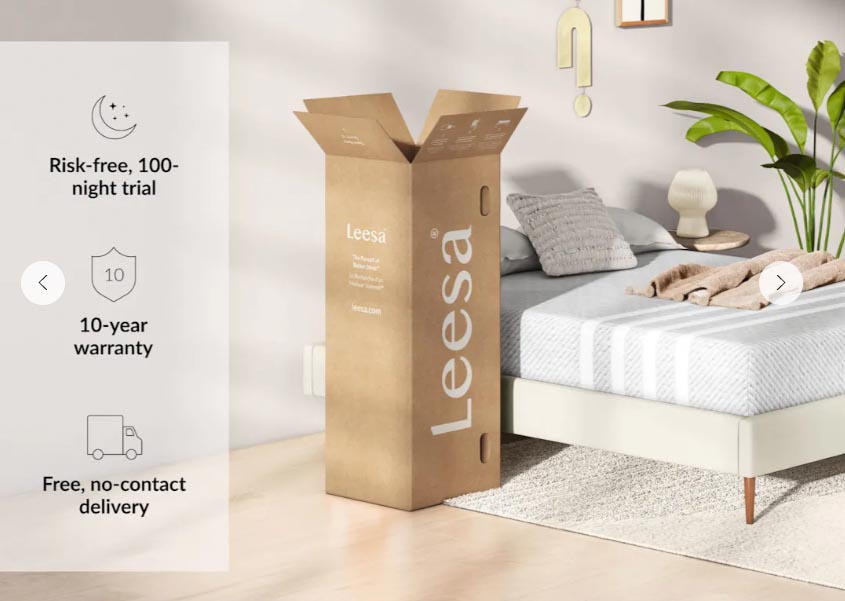Sad but true, many mattresses contain fiberglass. When looking for the perfect mattress, you shouldn't have to trade safety for comfort.
Fiberglass is a flame-retardant material that, while effective, poses potential health risks when exposed.
Fiberglass can irritate your skin, eyes, and lungs if released into the air. The last thing you want is to disrupt your peaceful sleep with concerns about airborne particles.

A Brief History of Fiberglass as a Mattress Material
Once upon a time, in the early 2000s, fiberglass made its debut in mattress production. It was readily available, cost-effective, and met flammability standards for mattresses, namely “the cigarette test” and open flame from candles. Fast forward two decades when California updated its flammability standards in 2021, encouraging manufacturers to move away from certain chemical flame retardants. Though a U.S. standard, the size of the U.S. mattress market influenced mattress production globally, including phasing out materials like fiberglass.
In the years that followed, the new standard ignited controversy over the health risks of fiberglass. Some mattress companies explored safer alternative materials; some did not. This prompted consumers to look for mattresses explicitly labeled “fiberglass-free.”
To help you make an informed decision, we've put together this guide to finding the best fiberglass-free mattress. We’ll explore
- what fiberglass is
- why it shouldn't be in your mattress
- how Leesa’s fiberglass-free mattresses deliver the restful, healthy sleep you deserve.
Why is Fiberglass in Mattresses?
Fiberglass is a synthetic material made of fine glass fibers and plastic.
Mattress manufacturers may weave a layer of fiberglass into the inner mattress cover, or "sock," because it's an excellent flame retardant. If there's a fire in your bedroom, the fiberglass will melt instead of catching fire, which protects you and helps manufacturers meet safety regulations.
The fiberglass is contained inside the mattress, and it was considered harmless for nearly a quarter of a century. But if the mattress cover is damaged or removed, it may release tiny glass particles into your home. Exposure to fiberglass can cause skin irritation, allergic reactions, coughing, and other respiratory issues—definitely not something you want lingering in your sleeping space.
Plus, since fiberglass is insulating, it traps body heat and doesn't allow your mattress to breathe as well, which decreases mattress longevity and may contribute to hotter nights. Hot sleepers will especially benefit from the cooling properties of fiberglass-free mattresses.
For your health, safety, comfort, and peace of mind, it's better to look for mattresses without fiberglass. There are plenty of mattress manufacturers, including Leesa, that use alternative materials to get the same flame-retardant effect.
Health risks of fiberglass exposure
There are a few reasons why fiberglass is harmful to your health:
When fiberglass particles escape from a mattress, they can become airborne. When inhaled, you may experience respiratory issues like coughing and difficulty breathing. Those conditions worsen if you have asthma.
If you've ever accidentally brushed up against some of the pink insulation common in older houses, you're probably well aware that contact with fiberglass causes skin irritation, rashes, and itching. Not a great recipe for a good night's sleep!
Our Arizona factory is entirely fiberglass-free! All Leesa mattresses are made from materials 100% safe for your home.
Do Leesa Mattresses Have Fiberglass?
No.
If you’re shopping for a new mattress and wondering whether Leesa uses fiberglass, rest assured—we don’t. Every mattress made by Leesa is completely fiberglass-free.
Instead of relying on fiberglass to meet safety standards, Leesa uses a chemical-free rayon barrier made from 100% regenerated cellulose. This rayon fiber is an excellent fire retardant—without sacrificing health or comfort.
Our Arizona-based factory is entirely fiberglass-free, so you can be confident that any mattress you get from Leesa is 100% safe for your home.
Consciously made mattresses
Safe Mattresses
Leesa mattresses are GREENGUARD Gold Certified, ensuring rigorous independing testing for safety. We also only use CertiPUR-US certified foams, ensuring they're free from harmful substances and have low VOC emissions.
Recycled Steel
The springs in our mattresses are crafted from 98% recycled steel, while our bed frame is made from steel reclaimed from U.S. railroad tracks to support a circular economy and reduce waste.
Fiberglass free
Our mattresses contain no fiberglass. They are crafted in our fiberglass-free factory using fire-retardant yarn with a rayon barrier. This chemical-free rayon fiber, derived from 100% regenerated cellulose, creates a protective layer that ensures both safety and comfort.
Certifications and labels
Fiberglass isn't the only harmful material that might be hiding in your mattress—you also have to watch for things like phthalates and VOCs. Check for certifications like CertiPUR-US and GREENGUARD Gold. These certifications guarantee that your mattress is free from harmful chemicals and meets rigorous safety standards. Rest easy, because all Leesa mattresses carry these certifications.
This leads us to our next point…
How to Check if a Mattress Has Fiberglass
Unfortunately, mattress manufacturers don't typically advertise that they use potentially harmful materials in their mattresses. Good news, though! These manufacturers must legally list the mattress materials on the label.
If you see "glass fibers" on the label, the mattress contains fiberglass.
A warning not to remove the mattress cover is also a good indication that the mattress is made with fiberglass since the cover is the only thing shielding you from those dangerous particles.
Reputable brands like Leesa often clearly state that their products are fiberglass-free.
If you're having a hard time finding the right information, don't hesitate to reach out to customer service or do some extra research to verify the materials used in a mattress before buying.
Fiberglass isn't the only material that might be hiding in your mattress - you also have to watch for things like phthalates and VOCs.

Types of Fiberglass-Free Mattresses
You have options when it comes to choosing a mattress without fiberglass. Whether you like a firm mattress, soft mattress, or even an organic mattress, you can find one that is fiberglass-free.

Memory foam mattresses
Known for their pressure-relieving properties, memory foam mattresses are made from viscoelastic polyurethane foam and offer great contouring support. While the high-density foam in memory foam mattresses does tend to retain heat, there are plenty of options available with cooling features like gel-infused foam layers. Memory foam is an especially great option for couples, as it offers excellent motion isolation and supports nearly all sleeping positions.
If you're looking for the best fiberglass-free memory foam mattress, we recommend the Leesa Studio for sleeping connoisseurs on a budget or the Leesa Original for those who need a little more cooling and breathability.
Latex mattresses
Constructed from either natural or synthetic latex, these mattresses are breathable, durable, and supportive. A latex mattress is an eco-friendly, non-toxic choice that will hold up for years, but the downside is that it tends to be more expensive than other options.

Hybrid mattresses
A hybrid mattress has a base of individually wrapped coils and a memory foam top (viscoelastic polyurethane). These mattresses offer a good balance of pressure relief and support, and they're more responsive and "bouncy" than all-foam mattresses.
Leesa’s uses safe foam materials, and our coils are made from 98% recycled steel.
Hot sleepers love the Leesa Sapira Chill for cooling relief, while eco-conscious sleepers appreciate the Leesa Natural Hybrid, made with organic cotton for an all-natural sleep experience. And if you want the crème de la crème of fiberglass-free mattresses, check out the uber-luxurious Leesa Reserve Hybrid.

Key Features to Consider in a Fiberglass-Free Mattress
If you're shopping for a mattress without fiberglass to protect your health and sleep quality, keep these factors in mind to find the perfect fit for your needs.
Firmness
A medium-firm mattress is ideal for most people, especially average-weight back sleepers, but it all depends on your size and sleep position. Side sleepers often prefer a plush soft mattress that offers better pressure relief and cushions their shoulders and hips, while back and stomach sleepers typically do better with a firmer mattress that keeps their spine aligned. Smaller people also tend to prefer soft mattresses, since they don't put as much pressure on the mattress and won't get the intended contouring effect with a firmer mattress.
Cooling and ventilation
Nobody likes to wake up sweaty in the middle of the night. Those who sleep hot should look for hybrid or memory foam mattresses with breathable materials or cooling technologies that help regulate body temperature. Leesa mattresses feature cooling layers and perforated foams to improve airflow and keep hot sleepers comfortable all night long.
Motion isolation
If you share a bed with a partner or a pet, motion isolation will keep you from interrupting each other's sleep. A mattress that minimizes movement transfer ensures that you won’t be disturbed every time your partner tosses or turns. Leesa offers a variety of memory foam and hybrid options made with motion isolation in mind.
Edge support
Strong edge support prevents that unpleasant roll-off sensation and creates a larger usable sleeping surface. If you tend to sleep close to the edge of the bed or enjoy sitting on the side, look for mattresses like the Leesa Legend Hybrid, which offers reinforced edges for extra stability.
Sleep Safely With a Fiberglass-Free Mattress From Leesa
We're getting more sleep than ever before, and when you spend 8+ hours in bed every day, it's important to make sure your sleep environment is both safe and cozy. Choosing a mattress without fiberglass is a smart investment in your health and comfort.
At Leesa, all of our high-quality, fiberglass-free mattresses meet rigorous safety standards and also deliver superior comfort and support. So, whether you’re a side sleeper, back sleeper, or somewhere in between, there’s a perfect Leesa mattress waiting for you. Take our mattress quiz today to find your best mattress—with no fiberglass—guaranteed.
Frequently Asked Questions About Fiberglass-Free Mattresses
Check out these commonly asked questions and answers on fiberglass-free mattresses.
Which mattresses are made without fiberglass?
At Leesa, we make all of our mattresses without fiberglass. We prioritize your safety and comfort by using a chemical-free rayon barrier for fire protection instead. No matter which Leesa bed you choose—soft, firm, hybrid, or memory foam—you can rest easy knowing that none of our mattresses contain fiberglass.
How do I know if my mattress is fiberglass-free?
To ensure that your mattress is fiberglass-free, always check the product details, certifications, and construction materials listed by the manufacturer. At Leesa, we’re transparent about our materials, so you can find this information right on our website. Look for certifications like CertiPUR-US or GREENGUARD Gold as well, which guarantee that the mattress meets strict safety and environmental standards.
Is it OK to sleep on a mattress with fiberglass?
While sleeping on a mattress with fiberglass isn’t inherently dangerous as long as the fiberglass remains contained, it’s important to be cautious. If the mattress cover is damaged or removed, fiberglass particles could escape, leading to potential skin, eye, and respiratory irritation. To avoid this risk, it’s better to choose a fiberglass-free mattress—like those offered by Leesa.
Is fiberglass in all foam mattresses?
Not all foam mattresses contain fiberglass. However, many lower-cost hybrid and memory foam mattresses, especially those made in China, use fiberglass as a flame retardant to meet fire safety regulations. At Leesa, we’ve chosen to craft our memory foam and hybrid mattresses without fiberglass, using safer alternatives like chemical-free rayon barriers instead.



